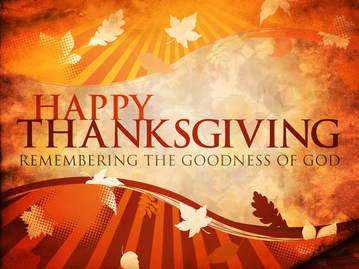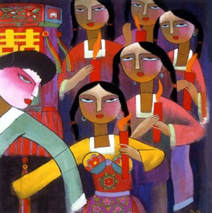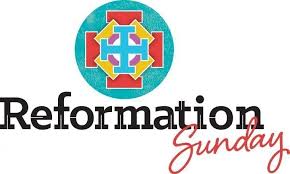
Judges 4: 1-7; Matthew 25:14-30:
What are you thankful for? I invite you to take out your insert in the bulletin. Right now, write down without too much thinking, three things you are grateful or thankful for. Did you find it? Now go. Let me know when you are done by looking up. So, what did you write? What are you thankful for? (get responses)
What are the most common answers? (family, friends, faith church, home, food….etc.). These answers tend to be the most common given in an exercise like this. It’s right that they are, because these responses describe our immediate experience of life. Family, friends and faith form the fabric of our lives. The love we find there creates the fuel which propels our living.
Our lessons today invite us to explore thankfulness from a different direction. The Scriptures strive to open our hearts to be thankful for not only what we receive, but for what we are able to give back. We are called not just to be thankful for the blessings in our life, but fundamentally for the ability to be a blessing to others. To be thankful that we can give. To be thankful that we can serve. To be thankful that we can make a difference by reaching out, caring for others through our presence and resources like money, food, books that we share. Pastor and author Mark Batterson puts it this way: “When God blesses you financially, don’t raise your standard of living. Raise your standard of giving.” Mother Teresa, or now, Saint Teresa of Calcutta, also adds, “it’s not how much we give but how much love we put in our giving.”
We must put our whole heart in our acts of giving.
Here’s the question for us to ponder today: have we ever thought that our ability to give is a blessing? Do we believe that it is a privilege to share what we can with charities and people in need? Do we know that giving should not only make us feel good but it is fundamental signpost of a mature life, a whole life, a life that points not inward but outward, seeking to make life better for others. In the act of giving we receive. Proverbs (11:25-26) teaches: “Whoever brings blessing will be enriched, and one who waters will himself or herself be watered.”
The story about the judge Deborah, or Devorah, is a tale about mighty giving – not of money so much as of self. Before there were kings in Israel, God would raise up judges, part prophet, part military leader, part legal leader, to rescue the people of Israel from a series of oppressive enemies. Most of all judges strove to bring the people back to God.
Deborah is the first and only female judge in Israel, and the only judge called to be a prophet. She is one of these characters who shows us how to give. Deborah was a leader, a mediator, counselor, and adviser of the people when God calls her to further action while the Israelite were oppressed by the Canaanites. This oppression lasts for twenty years – half a lifetime in the ancient world -- because the people of Israel deserted their God and started worshiping other false gods.
Now, twenty years is a long time in the ancient world. The average lifespan, given disease and accidents, was about 35-40 years. So, the oppression the Israelites faced was half a lifetime. It was half of the time of the forty-year wilderness journey. Deborah worked long through those difficult times, dark times, for the people. God leads Deborah to take on the role of military adviser. It is Deborah who summons the military leader Barak to go to battle. She gives orders like a general. Barak agrees to go only if Deborah goes with him. Deborah agrees with no thought to her own safety, and she goes to the battlegrounds.
Because Deborah uses her intellect, her discernment, her leadership skills on behalf of the welfare of her community - remarkable as a woman in the male-dominated ancient world - she helps to bring about the end to an era pf oppression. Deborah models for us to be bold in the face of need, for we too live in difficult times, in dark times. Deborah is an example for us to be unafraid, to shine boldly. Deborah encourages us to use all of ourselves, all the gifts at our disposal, to be leaders of justice and mercy. Deborah is even cited as an example in this weekend’s New York Times article on Judge Rachel Freier, considered to be the first female Hassidic judge in the nation.
Our gospel lesson, the parable of the talents, reinforces this summons to give of ourselves into the world. On the surface it sounds like a parable about making money and huge profits. It seems to teach us that not making a profit is bad. In fact, it is not only bad, but lands you in hell. The third slave - who didn’t invest the money entrusted to him - is judged lazy and wicked, and sent to the outer darkness, amid weeping and gnashing of teeth. Where’s is the compassion in this story?
Jesus, however, is not really talking about money. The talents represent our faith, our very selves, our abilities in addition to our financial blessings. Jesus describes in this parable, faithful action in the world verses playing it safe and hiding away. The one-talent slave is consumed with fear. The one-talent slave is the only one who articulates how he feels about the master. Because he’s afraid he stays inward focused. He withdraws from the world. He buries the talent in the ground, where it can’t be seen, touched or spent. He ignores the real possibilities of engagement. So, the money cannot be engaged in the life of the community. It stays one talent.
The two-talent and five talent slaves do not let fear guide their actions. They immediately get to work and invest their money in the world. They are outward-focused. The talent they invest in the community doubles for both of them – a fantastic amount. This pleases the master. He calls them good and trustworthy, or faithful slaves.
Jesus is telling us in this parable that we are created to give. Each of us, created in the image of God, a God who empties Godself utterly for us and creation. So, we too are meant to be grateful givers. God, like the master in the parable, invests incredibly in all his servants. Jesus calls us to follow the two- and five-talent slaves. The gifts of our monies, our love, our skills have the potential to expand exponentially in the world. Jesus further explains it this way earlier in Matthew: “so, that you may be children of your Father in heaven; for he makes his sun rise on the evil and on the good, and sends rain on the righteous and on the unrighteous. Matthew 5:45” God’s giving is indiscriminate and nonjudgmental. So too we must expand our giving horizons so our gifts are used for reconciliation and healing.
This Sunday the stewardship season begins at Union Church. Today, the week before thanksgiving, and a week before the retail madness of Christmas sets in, we are called to give. God calls us to give, to give to others in need-- to causes, but also to our faith community -- because giving is the foundation of our identity as Christians. We are asked to support the church, so we can be collectively active in the community. In doing so we emulate the love of God and the teachings and saving acts of Jesus. Like Deborah we are called to invest ourselves in the world in unique and creative ways to bring wholeness around us. Like the two-talent and five-talent slaves we are called to invest ourselves, so that our giving plants seeds and grows exponentially. As we make out our Christmas lists during the next month, let Union Church, and other worthy causes be at the top of the list. Just make a list to include organizations doing good in the world, a separate gift list that doesn’t involve getting back in return. We need to pledge not only our money, but our time and of our abilities.
How many of us remember the humorist Erma Bombeck? She was known for her funny and insightful newspaper columns and books back in the days. One example of her wisdom comes from a column thirty years ago:
I always had a dream that when I am asked to give an accounting of my life to a higher court, it will go like this: "So, empty your pockets. What have you got left of your life? Any dreams that were unfulfilled? Any unused talent that we gave you when you were born that you still have left? Any unsaid compliments or bits of love that you haven’t spread around? "
And I will answer, "I’ve nothing to return. I spent everything you gave me. I’m as naked as the day I was born."
Is your pockets full of unfulfilled dreams, unused talents, bits of love or unsaid compliments? Now is the time. Empty your pockets and give. Give generously. Be one of a kind, like Deborah, whose giving made her one of 12 judges in the bible. Be like the two and five talent slaves who threw themselves with abandon in the world. This giving season, know the true blessing of giving; in doing so become a good and faithful servant of the Most High, our Divine Giver. Amen.


 RSS Feed
RSS Feed